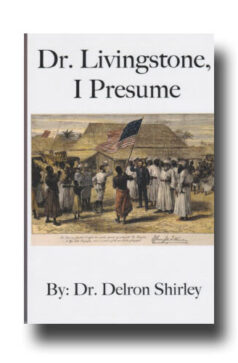The Body
One of the suggestions I made early on in our study was to get involved in a local church. Some believers have difficulty with this advice because they feel that they can study their Bibles on their own, pray privately, and have their individual relationships with the Holy Spirit – all without being part of an organized community of faith. However, anyone who takes any of these other cornerstones of faith seriously will eventually realize that each of them forces us to become an integral part of and actively involved in a family of believers. On almost every page of the Bible, we see that both the Old Testament heroes and the New Testament saints practiced their faith in the context of a community. As soon as we begin to pray, we realize the interdependence of people of faith as we are prompted to pray for others and desire that they would also support us in their prayers. The Holy Spirit works in the life of each believer, giving him gifts which cannot function in a void and fruit which is pointless outside the context of an interactive community. As anyone genuinely begins to exercise his personal faith, he immediately realizes that it can only be truly operative when shared with others in a deliberate and purposeful way.
But why? Why is it so significant that we be people of faith rather than simply individual persons of faith?
One aspect of the answer can be found in our aggressive resistance of the enemy’s forces. Jesus told His disciples that the gates of hell could not prevail against His church. (Matthew 16:18) It is the unified force of the church – not the lone strength of individual believers – that is the deterrent force against the devil. When the Apostle Paul taught us about putting on the spiritual armor in Ephesians chapter six, he addressed the “brethren” – not an individual brother or a random assortment of brothers – implying that spiritual warfare was to be understood as an activity of the army, not individual soldiers.
Another significant element is the internal protection afforded to each member by the structure of the overall organization – or better, the overall organism. Yes, the church is an organization with offices and positions in which all the individual members serve; however, it is much more accurately described as a living organism in which each member is an integral part functioning in its place. Unlike a corporation in which each person has his own individual life and serves a function within the corporate flow chart, the church is a living organism made up of many members who lose their identity and purpose if segregated from their roles within the body. Just as your spleen cannot function and would have no purpose if it were surgically removed from your abdomen, so the members of the church must be incorporated into the overall organism for their personal identity and health as well as that of the whole body. This is why the author of Hebrews admonished us that we not forsake the assembling of ourselves together as an organized church community – and then added that this was especially urgent in light of the evil influences which would try to invade our lives and the life of the church as a whole. (verse 10:25)
It is in the interaction of the various members of the church that each one finds security, protection, maturity, and purpose. Pastors and teachers instruct and train the new members, pastors (symbolically called “shepherds”) protect and guide the congregation (symbolically referred to as the “flock”), individual members encourage and challenge one another, prophets instill vision into the believers, and apostles and elders give the body as a whole identity and purpose.
Emphasizing that the church is indeed an organism rather than an organization, the Apostle Paul used the symbolism of the human body to describe the interdependence of the multiple parts in I Corinthians chapter twelve. There, he expressed the dependence of each part on all the other parts and the necessity of each part to the wellbeing of the whole. Just as the real purpose of a physical body is to house and give expression to the spiritual life that is within it, the purpose of the church is to house and give an outward expression to the Spirit of Christ that resides in the Body of Christ. With this truth in mind, let’s explore what it means to be a member of the Body of Christ through whom the Holy Spirit can work and manifest Himself.
Manifesting the Spirit in Your Life and Ministry
The Apostle Paul introduces chapter twelve of I Corinthians with the admonition that we should not be ignorant of spiritual things. Although most translations use the word “gifts” in this sentence, that term is in italics indicating that it is not part of the original Greek text. Actually, Paul wants us to learn about more spiritual realities than just the gifts. In I Corinthians 12:7, Paul speaks of “manifestations of the Holy Spirit.” The use of this term makes us keenly aware that he is not talking about human ability, but divine ability operating in these functions. The verses leading up to this passage suggest that the manifestations can be subdivided into three categories. Gifts are given by the Holy Spirit. (I Corinthians 12:4) Administrations are given by Jesus, the Lord. (I Corinthians 12:5) Operations come from God. (I Corinthians 12:6) Paul goes on to list the specific functions within each category. These listings may not be all-inclusive in that we see other lists in other portions of scripture that seem to complete or augment the items enumerated here.
The gifts of the Spirit are listed in I Corinthians 12:8-10:
1) Word of wisdom
2) Word of knowledge
3) Faith
4) Gifts of healing
5) Working of miracles
6) Discerning of spirits
7) Prophecy
8) Diverse kinds of tongues
9) Interpretation of tongues
The administrations of the Lord are spelled out in I Corinthians 12:28-30:
1) Apostles
2) Prophets
3) Teachers
4) Miracles
5) Gifts of healing
6) Helps
7) Governments
8) Diversities of tongues
The operations of God are discussed in I Corinthians 13:13:
1) Faith
2) Hope
3) Love
The emphasis of chapter thirteen is that each work done must be motivated by love. The operation of each of these works in the church is the manifestation of the personality of God the Father who is working through love. (I John 4:8)
The purpose of our present study is to understand exactly how we, as people who are called of God, can become the ministers we have been called to be. Therefore, let’s concentrate on what the Bible says about the various positions listed in the scriptures. Ephesians 4:11 lists the five “offices” known as “gifts.” These are apostles, prophets, evangelists, pastors, and teachers. The Greek word used in verse eight to entitle this category of “offices” is doma. It is not at all related to the Greek term charismata that is used in Corinthians to signify the gifts of the Holy Spirit. Doma comes from the root word didomi, meaning “to give a present.” This root word is used in verse eleven. This Greek term is used throughout the New Testament to indicate physical gifts. (Matthew 7:11, Luke 11:13, Philippians 4:17) Charismata is always used to denote the manifestation of a spiritual enduement. (Romans 1:11, 5:15-16, 6:23; I Corinthians 1:7, 7:7, 12:31; II Corinthians 1:11; I Timothy 4:14; II Timothy 1:6) The charismata are the spiritual powers resident in a man, and the doma is the man himself who has been given to the church.
One other Greek term translated “gift” is the word merismos which is used only once in the New Testament. (Hebrews 2:4) This term literally means “to divide” and is used with this meaning in the same context as its derivative word. (Hebrews 4:12) When it is used to refer to the manifestation of the Holy Spirit, it seems to indicate the diversity of the manifestations as they are distributed to (or divided among) various church members.
These men and women, endued with spiritual manifestations, are given to the church for important functions. Paul describes these functions as the perfecting of the saints, doing the work of the ministry, and edifying the Body of Christ. (Ephesians 4:12)
Within the “manifestation of the Holy Spirit,” there is an interesting progression. The gifts (charismata) are given by the Holy Spirit as spiritual enduements. The administrations are men and women (doma) possessing the spiritual enduements who are placed in the church as ministers. The operations are the godly attitudes in which the ministers function as they display their spiritual enduements. This is the triple trinity: the trinity of the Father, Son, and Holy Spirit; the trinity of gifts, administrations, and operations; and the trinity of enduements, ministers, and motivations. Paul and Peter explain further how the administrations possessing the gifts are to be in operation. Romans 12:6-21 proclaims:
Having then gifts differing according to the grace that is given to us, whether prophecy [gift], let us [administration] prophesy according to the proportion of faith [operation]; or ministry [gift], let us [administration] wait on our ministering [operation]: or he [administration] that teacheth [gift], on teaching [operation]; or he [administration] that exhorteth [gift], on exhortation [operation]: he [administration] that giveth [gift], let him do it with simplicity [operation]; he [administration] that ruleth [gift], with diligence [operation]; he [administration] that sheweth mercy [gift], with cheerfulness [operation].
In verse nine, Paul begins to describe the qualities of love, which is the motivation for the operations of God, and the manifestation of the Holy Spirit.
Let love be without dissimulation. Abhor that which is evil; cleave to that which is good. Be kindly affectioned one to another with brotherly love; in honour preferring one another; Not slothful in business; fervent in spirit; serving the Lord; Rejoicing in hope; patient in tribulation; continuing instant in prayer; Distributing to the necessity of saints; given to hospitality. Bless them which persecute you: bless, and curse not. Rejoice with them that do rejoice, and weep with them that weep. Be of the same mind one toward another. Mind not high things, but condescend to men of low estate. Be not wise in your own conceits. Recompense to no man evil for evil. Provide things honest in the sight of all men. If it be possible, as much as lieth in you, live peaceably with all men. Dearly beloved, avenge not yourselves, but rather give place unto wrath: for it is written, Vengeance is mine; I will repay, saith the Lord. Therefore if thine enemy hunger, feed him; if he thirst, give him drink: for in so doing thou shalt heap coals of fire on his head. Be not overcome of evil, but overcome evil with good.
First Peter 4:10-11 echoes the same pattern:
As every man [administration] hath received the gift [gift], even so minister the same one to another, as good stewards of the manifold grace of God [operation]. If any man speak [administration], let him speak [gift] as the oracles of God [operation]; if any man [administration] minister [gift], let him do it as of the ability which God giveth [operation]: that God in all things may be glorified through Jesus Christ, to whom be praise and dominion for ever and ever. Amen.
Since our purpose in this section is to deal with the “offices,” or people in the ministry, let’s center our attention on the term “administrations.” The Greek word is diakonia, which comes from the root word diako, meaning “to run errands.” The family of English words translated from the root term includes: “minister,” “serve,” “office,” “ministry,” “administration,” “servant,” “ministration,” “relief,” “service,” “deacon,” and “office of deacon.”
This same term is used to refer to what we might think of as “high spiritual” offices and “lower helps” offices in the church. Notice how the word reoccurs in Acts 6:1-4, sometimes referring to the deacons and sometimes to the apostles.
And in those days, when the number of the disciples was multiplied, there arose a murmuring of the Grecians against the Hebrews, because their widows were neglected in the daily ministration. Then the twelve called the multitude of the disciples unto them, and said, It is not reason that we should leave the word of God, and serve tables. Wherefore, brethren, look ye out among you seven men of honest report, full of the Holy Ghost and wisdom, whom we may appoint over this business. But we will give ourselves continually to prayer, and to the ministry of the word.
This term is used to refer to a multitude of various biblical characters in various stations of church hierarchy. A few examples include angels (Matthew 4:11), Peter’s mother-in-law (Matthew 8:15), Martha (John 12:2), Paul (Romans 11:13), Timothy (I Thessalonians 3:2), household servants (John 2:5), and even Jesus (Matthew 20:28). Therefore, we are able to understand that all who are called into the ministry, whether in mundane service or in high authority are simply errand runners for God.
The qualifications (I Timothy 3:8-12) and rewards (I Timothy 3:13) of the office of diakonia or errand runner were spelled out by the Apostle Paul.
There is also an office of oversight that directs the functioning of the church body. This is the office of bishop or elder. “Bishop” and “elder” seem to be synonymous terms. When Paul arrived in Miletus, he summoned the elders of the church from Ephesus. (Acts 20:17) In his speech to them, Paul addresses them as “overseers” (Acts 20:28), which is an alternate translation of the word episkopos, or “bishop.” When addressing Titus, Paul also used the terms interchangeably. (Titus 1:5, 7)
The qualifications for the office of episkopos are given to Timothy (I Timothy 3:1-7) and are continued with the listing of qualifications for bishops in the letter to Titus. (Titus 1:5-9) One interesting point to note about these offices is that, even though not all elders are preachers and teachers (I Timothy 5:17), the total work of an elder is spiritual (I Peter 5:1-3, James 5:14-15). The biblical pattern for selecting elders is that they are put in office by appointment of an apostle or his delegated representative. (Acts 14:23, Titus 1:5)
Now that I’ve impressed you with my ability to translate Greek, let me tell you in English what I’m trying to say. It’s very simple. Those people who are called into the ministry are called as errand runners for God. This is a very important truth to keep in mind; otherwise, we may begin to think more highly of ourselves than we ought to think. (Romans 12:3) Whether apostles or ministers of helps, we are errand boys for God. We must serve in that position with a humble spirit. A second classification of servants in the Body of Christ is the oversight ministry. These men and women are the decision-makers of the church. They stand in an important position of being the eyes and ears of the Church – seeing and hearing God’s plan – and then directing the church accordingly.
Each person, no matter what his ministry position is in the body, should be seen as a physical gift from Jesus to the church. If the individual is operating under the motivation of the character of God the Father (love), he is an administration through whom the spiritual gifts of the Holy Spirit can flow. When we have the enduement from the Holy Spirit flowing though Jesus’ man with the Father’s character, this produces the manifestation of the Spirit – which is the key to a successful ministry.
Service Gifts
When God placed Aaron into the position of High Priest, He admonished him: I have given your priest’s office unto you as a service of gift. (Numbers 18:7) Most versions of the Bible follow this wording in their translations. The Living Bible reverses the order of the words to read, a gift of service. Both readings are possible and, to my mind, equally significant. Every minister must continually remember that his ministry is a gift to him; it is his “gift of service.” No matter how many years of Bible school or seminary training he has had, no matter how many hours he has prayed, no matter how many days he has fasted, no matter how many tapes he has heard or books he has read – he did not earn it. His ability to minister and his position in the ministry came simply as a gift from God. Certainly, the schooling, prayer, fasting, tapes, and books help define and refine the ministry, but the real essence of his ministry is that it is a gift from God to him. God gave him a gift of service to serve the Body of Christ. On the other hand, the minister must always remember that his ministry is a “service of gift.” This means that he is to service the Body of Christ with what God has placed in him. The ministry is not “works”; it is pipelining God’s gifts to men. The minister cannot give anything except what first flows into him from God. He must have a supernatural enduement to impart to the people. The ministry is a gift to the minister. But in either translation, it is clearly evident that the purpose of the gift is to serve. Whether read “service of gift” or “gift of service,” we constantly are reminded that the minister must be totally consumed with serving the church of God.
From this short sentence, we see two very important truths concerning those who are called into any form of ministry.
1) The position and the ability to fulfill the duties of that position are gifts from God.
2) The purpose for the position is to serve.
Let’s explore the implications of these two simple truths within our own lives and ministries.
The first question we must ask ourselves is, “Do I really have a gift?” The biblical answer is, “Most certainly!” Paul emphasizes that we each have a gift of one sort or another. (Romans 12:6) He reiterates this idea when he says that everyone has a manifestation of the Spirit which he relates to the gifts placed into our lives by the Holy Spirit. (I Corinthians 12:7) Even Jesus Himself conveyed the same point when He told the parable of a master who entrusted each of his servants with talents. (Matthew 25:14)
The second question that follows immediately after the first one would be, “Well, if I do have a gift, how do I find out what it is?” Actually, it is rather easy to discover your area of gifting. Simply look for three things:
1) The things that interest you
2) The things that bother you
3) The things for which you seem to have a knack or special ability
Let’s take a look at the life of the Apostle Paul and see how these three indicators point toward his gifting. First of all, we see that he was interested in theology. Paul grew up as a freeborn Roman citizen (Acts 22:28) in the city of Tarsus, which he called “no mean city,” indicating that it was far above the average city of his time (Acts 21:39). Indeed, it was no average place in that it was a major center of commerce, education, and military power. With the excellent education which his writings demonstrate that Paul possessed and his Roman privilege coupled with the strong ethic his Jewish upbringing afforded him, Paul could have been a success in any field he would have chosen to pursue: business, military, academics, etc. Yet, he chose to abandon any of these lucrative pursuits and give himself to the study of theology at the rabbinic school of Gamaliel in Jerusalem (Acts 22:3), a career that rendered him so little financial security that he had to augment his livelihood by making tents (Acts 18:3). Next, we see that Paul was bothered by heresy; that’s why he was persecuting the church. (Acts 9:2) He was adamant that the Christian movement, which he considered to be a blasphemous perversion of the Jewish faith, be crushed to death before it had a chance to spread its infectious heresy any further. In the third category, it is abundantly clear that he had the ability to teach and expound doctrine. We have already noted that he studied as a personal disciple at the feet of Gamaliel, who is recognized even until today as one of the ten greatest rabbis in Jewish history. His eloquence and clarity in expressing even the most complex concepts are evidenced through the record of his sermons and speeches in the book of Acts and in the written legacy left to us in his epistles.
These three indicators would suggest that Paul’s gift would lie in the arena of theology – and, indeed, it did. He describes his understanding of theology and doctrine as a gift directly from Jesus (Galatians 1:11-12), not an academic achievement obtained from his books and mentors. We can easily see how Paul – who excelled in his knowledge of and belief in the Old Testament truths as they had been conveyed to him through his Jewish heritage, religious traditions, and rabbinic interpretations (Philippians 3:4-6, Acts 22:3, Galatians 1:13-14) – would be totally disoriented and confused when he suddenly encountered the risen Jesus and discovered that He was indeed the true messiah, not a blasphemous imposter as Paul had concluded from the years he had spent poring over the writings of his Jewish faith. In that dramatic encounter on the road to Damascus, Paul’s spirit cried out in an acknowledgment that his head refused to accept. Before his head could reason out the situation, his heart erupted out of his mouth acclaiming Jesus as Lord. (Acts 9:5-6) Immediately he found himself in a quandary, trying to reconcile the contradiction between the interpretation he held of Old Testament truths (which he could not abandon because he was still convinced that they were the Word of God) and the supernatural revelation he had just received. The result was, as he described it in Galatians, a gift – a revelation, an impartation, a supernatural insight. It was so powerfully personal to him that he felt confident to refer to it with such personally possessive phrases as “my gospel” (Romans 2:16, 16:25; II Timothy 2:8) and “our gospel” (II Corinthians 4:3, I Thessalonians 1:5, II Thessalonians 2:14).
In writing to the Romans, Paul made reference to his desire to visit them and impart a gift to them so that they would be established. (Romans 1:11) After consideration of all the possibilities of what it could have been that he planned to give to these fellow believers, the most apparent possibility is that he wanted to leave them with a clear understanding of the doctrine of Christ. This is exactly what his epistle is – a full systematic theology of the doctrine of salvation, explaining that all men are sinners, that God has made a plan for salvation and complete restoration for man, that the Holy Spirit is the power of the Christian life, and that certain responses are required on man’s part.
So we can see how Paul’s area of interest, the thing that bothered him, and the thing for which he had a knack easily defined his area of gifting. The same is true in our lives as well. Those people who have a way with children, are troubled when they see neglected children, and find interacting with children enjoyable are not very likely to find their life’s calling in the nursing home ministry! It really shouldn’t take a lightning bolt from heaven to awaken you to your specific and special gift.
Once you have recognized that you have a gift and have determined what that gift is, you need to begin to develop that gift. Of course, we must remember that the gift is from God; it is not something we learn in school or obtain by training. However, it must be polished through our deliberate effort. There are two different avenues through which we can enhance and refine our gifting.
The first is through natural training. Paul did that as he sat at the feet of Gamaliel and was taught according to the perfect manner of the law of the fathers. (Acts 22:3) We, too, must submit ourselves to the natural education process – whether formal or informal. Perhaps you may attend a Bible college or other formal training institution to learn the skills associated with the area of gifting you have discovered within yourself. Perhaps you will find that seminars or on-the-job training are the approach you need to take. In many cases, being mentored by someone who is already operating in the same gifting is an excellent way to develop in your own gifting. It may be that just carefully gleaning from the informal opportunities you have may be sufficient.
The second avenue is spiritual pursuit. Almost immediately Paul received that revelation on the Damascus road, he headed into the desert of Arabia for three years. (Galatians 1:17-18) Although there is no record of exactly what happened during this period of isolation, he most certainly spent that time comparing his Old Testament knowledge with the revelation he had just received from Jesus. There must have been long days of study and lengthy seasons of prayer – struggling with every scripture and each tradition – until he was able to attest without any sense of contradiction that the Old Testament is indeed holy, just, and good and that it is a schoolmaster bringing us to the revelation of Christ. (Romans 7:12, Galatians 3:24) In the same way, we must plunge ourselves into spiritual instruction through study of the Word (II Timothy 2:15), through submission to spiritual leadership (Ephesians 4:11-12), through spiritual impartation (II Timothy 1:6), and through prayer (Jude 20).
In the secular world of entrepreneurism, there is a philosophy for success that, simply stated goes, “Find a need and fill it.” In the arena of ministry, the same principle is phrased, “People gravitate to where their needs are being met.” These two formulas express the next principle we must follow as we pursue our gift of service: match your gift with a place of service. Paul matched his gift – his unique ability to explain the gospel of salvation – to a worldwide audience. In fact, he explained to the church at Rome that he actually felt an obligation to serve both Jew and gentile. (Romans 1:14) His sense of mission was primarily to the Jew, for whom he said that he was even willing to be accursed if it would serve as a catalyst to bring them to the revelation of the gospel (Romans 9:3); however, he recognized that the gentile, which actually became the most fertile ground of his ministry, was also an area in which he could serve with his gifting. (Romans 1:16) In Paul’s zealous quest for areas of service, God actually had to step in and stop him from going into Asia with his revelation and give him a vision of the most fertile area for the service of his gift. (Acts 16:6, 9) In his seemingly non-ending determination to find a field of service where his gift could be applied, the apostle desired to eventually reach Rome – the very heart and soul of the current society – and then proceed to Spain – the furthest boundary of the then-civilized world. (Romans 1:15, 15:24)
In pursuing our ministries, we must always be alert to areas of need where our gifts will make a difference. While we don’t want to try to sell iceboxes to Eskimos, there are millions of others who will readily respond to the ministry we can provide. When you do begin to match your gifting with areas of need, you will soon discover the next truth about your gift: it will provide a platform of influence for you and cause you to flourish.
King Solomon, who had a gift of tremendous wisdom which he used in ruling his people with insightful counsel and brilliant international diplomacy, expressed this principle which had certainly proven to be true in his own life: A man’s gift makes room for him, and brings him before great men. (Proverbs 18:16) From the moment he received his revelation, Paul was destined to be given the platform to stand even before kings and expound that revelation. (Acts 9:15, 26:16-18) The fact that he may not have had the most coveted conditions under which to minister this revelation to these men did not hamper the effectiveness with which he delivered his gift to them. (Acts 13:12, 26:28) His assessment of his ministry covering the territory from Jerusalem to Illyricum in central Greece confirms the principle that his gifting had caused him to flourish. The gospel had been so fully preached in that area that there was no place left in the region where he needed to minister. (Romans 15:19, 23) Likewise, as we serve with our gifts in areas where these gifts are needed, we can expect them to be as seeds we are planting which will bring forth a harvest return of thirty-, sixty-, or even a hundred-fold. (Mark 4:8)
Continuing to use the Apostle Paul as our pattern, let’s further our study on serving with our gifts into exploring exactly how we can use our gifts most effectively. In I Thessalonians 1:5, Paul makes one simple statement that reveals five avenues through which we can convey our gifts.
For our gospel came not unto you in word only, but also in power, and in the Holy Ghost, and in much assurance; as ye know what manner of men we were among you for your sake.
The first avenue he mentioned was the Word. At first glance, we might be confused by thinking that his revelation of the gospel message and the Word of God are the same thing. However, this is not necessarily true. Just because we have a supernatural revelation of a truth does not mean that we are ready to start ministering it as fact. That revelation must first be confirmed and proven through the scriptures and then presented within a biblical context. Every gift we minister should be ministered from a biblically based foundation.
Paul’s second avenue was power. In a passage we have already mentioned, the apostle described what made his Jerusalem-to-Illyricum ministry effective: mighty signs and wonders, by the power of the Spirit of God. (Romans 15:19) All we need is a quick review of the book of Acts to see that his ministry was indeed accompanied with miraculous events. (Acts 13:11, 16:16-18, 19:11, 20:9-10, 28:3-6) However, we may be tempted to relegate such supernatural occurrences to ancient history or to the lives of such men of stature as this apostle of the faith. The truth is that this same supernatural assistance is available for – and actually expected to be operative in – the ministry of all believers. (Mark 16:17-18) Some people may respond to – and even recoil at – the concept of the necessity of the demonstration of supernatural power in the ministering of our gifts by questioning why it would be considered necessary to display such supernatural power in any and every ministry. They might feel that such displays of divine power should be reserved for evangelists. In a sense, such a conclusion is at least partially true. The scriptures do teach that these supernatural manifestations are given to different members of the Body of Christ as they would have special need of their operation (I Corinthians 12:11); however, the same section of scripture emphasizes that each person should have some form of supernatural operation in his ministry (I Corinthians 12:7).
Although every person may not require the ministry of healing in order to adequately serve in his gifting, he will need at least one of God’s supernatural forms of empowerment in this endeavor. For example, even in the compassion ministry of feeding the hungry and clothing the naked (Matthew 25:35-36), we will need the gift of faith that is listed right alongside the gift of healing (I Corinthians 12:7). Without the supernatural manifestation of faith, no one will ever be able to finance the gargantuan challenge. (Matthew 26:11) In addition, we all need the supernatural assistance afforded us through speaking in tongues that the Bible describes as an avenue of personal edification (I Corinthians 14:4) – a personal strengthening which is absolutely necessary to meet the challenges of any ministry.
Next, Paul mentions the Holy Ghost. In that the operation of the gifts seems to have been his topic in the previous category, we must interpret this reference to suggest a fuller meaning of the operation of the Holy Spirit in the believer’s life. Turning to his letter to the Galatians, we see at least two areas where the Holy Spirit’s influence must be evidenced in a believer’s life and ministry. The first is in chapter five verses sixteen and eighteen: walking in and being led by the Spirit. Such Holy Spirit orchestrated movement is not only vitally important to the success of our personal lives and the productivity of our ministries, but it may also make the difference between life and death. As Paul mentioned in the Galatian passage, the fatally destructive works of the flesh will overcome us unless we walk in the Spirit. In addition to the example we have already examined of how the apostle was directed away from Asia toward a fertile ministry in Europe through the Holy Spirit’s direction, it would be good to remember how the inner voice of the Holy Spirit warned Paul of the impending danger into which his ship was to sail. (Acts 27:10)
The other Holy Spirit quality that Paul discusses in Galatians chapter five is the fruit of the Spirit listed in verses twenty-two and twenty-three. The life that bears spiritual fruit is the life that will catch people’s attention.
Paul follows with the quality of assurance. Even without an examination of some of the key biblical injunctions concerning assurance (Isaiah 32:17, Acts 17:31, Colossians 2:2, Hebrews 6:11, 10:22), we can recognize from the natural world that we never want to believe what someone is saying if we don’t feel like he really believes it himself. Paul was persuaded of the validity of his message (Romans 8:38, 14:14; II Timothy 1:12) and admonished his disciples to be fully persuaded concerning their faith (Romans 14:5).
Character is the fifth avenue through which Paul conveyed his gift. In our Thessalonian passage, he called it the “manner of man.” To get a definition of this term, we can turn to his farewell to the Ephesian church where he again used this same expression and gave a rather lengthy explanation.
And when they were come to him, he said unto them, Ye know, from the first day that I came into Asia, after what manner I have been with you at all seasons, Serving the Lord with all humility of mind, and with many tears, and temptations, which befell me by the lying in wait of the Jews: And how I kept back nothing that was profitable unto you, but have shewed you, and have taught you publickly, and from house to house, testifying both to the Jews, and also to the Greeks, repentance toward God, and faith toward our Lord Jesus Christ…Wherefore I take you to record this day, that I am pure from the blood of all men. For I have not shunned to declare unto you all the counsel of God… Therefore watch, and remember, that by the space of three years I ceased not to warn every one night and day with tears…I have coveted no man’s silver, or gold, or apparel. Yea, ye yourselves know, that these hands have ministered unto my necessities, and to them that were with me. (Acts 20:18-34)
The purity of his motives and the unselfishness of his service permeate the speech and testify to the quality of life he lived before the people. Who he was backed up what he said. As the old expression goes, he walked the walk and talked the talk. Another aphorism reminds us that people don’t care what you know unless they know that you care. Our personal character is likely the most powerful force in communicating the gifting that Christ has placed inside of us.
Having examined some of the ways we can discover and then develop and use our gifts from God in service to those who need our gift, it would be good to explore some scriptural principles concerning service. The first – and possibly foremost one – would be the connection between service and greatness. Interestingly enough, the two are interdependent upon one another. Jesus taught us that true greatness will produce service and service will produce true greatness. (Luke 22:26-27) A truly great person has gone beyond the insecurities of his status and the false pride of his position to recognize that he has been empowered to be able to empower others. On the other hand, the person who, unencumbered by the desire for status or concern for position, genuinely serves others and will invariably be elevated to greatness even without any personal efforts for the promotion.
The second principle is that true service involves sacrifice without a quest for gain. Paul demonstrated this in his ministry time and again. Echoing the attitude of Jesus Himself who came with the determination to minister to others rather than to have them minister unto Him (Mark 10:45), Paul said that he would gladly spend and be spent in his ministry to them. (II Corinthians 12:15) In another passage that seems reminiscent of the concluding portion of Jesus’ statement about giving His life as a ransom, Paul came to the almost unimaginable conclusion that he was willing to be accursed from Christ if it would result in the salvation of people. (Romans 9:3) Great people throughout history have demonstrated the same self-sacrificing quality. King David insisted on leading – rather than simply ordering – his men into battle until his chief counselors had to convince him that he should remain behind because of his advancing age. (II Samuel 21:17) Moses was so determined to personally minister to the needs of each of his charges that his father-in-law had to warn him that he was endangering his own health due to overexertion. (Exodus 18:14) When confronted with the danger facing her people, Queen Esther determined to save them even at the risk of her own peril. Her immortal words, If I perish, I perish (Esther 4:16) echo throughout history as a precursor to the great battle cry of service from the lips of Jesus Himself, Greater love hath no man than this, that a man lay down his life for his friends (John 15:13). Likely motivated by the lesson about the difference between true shepherds and hired hands (John 10:11-12) that he had learned directly from the lips of his master, the Apostle Peter admonished those who would be ministers that they must serve sacrificially without concern for personal gain (I Peter 5:2).
The third principle is that true service is always baptized in prayer. Looking back to the period of the judges, we see a powerful testimony to the necessity for a servant leader to be committed to prayer. Even when the people of Israel had refused the godly counsel of their God-appointed judge, Samuel determined that he would not cease his intercession on their behalf. (I Samuel 12:23) Jesus certainly set the pattern of protective supplication on the part of His disciples when He intervened for Peter in prayer. (Luke 22:31-32) But it is in the life of our friend, the Apostle Paul, that we can see a dramatic demonstration of the role of prayer in the life of a servant leader. He repeatedly reconfirmed his constant intercession on behalf of the churches as a whole and the individual members within the Body of Christ (I Corinthians 1:4, Philippians 1:3-4, Colossians 1:3, I Thessalonians 1:2, II Thessalonians 1:3, II Timothy 1:3, Philemon 1:4), but it is in his letter to the Romans that we see the overwhelming role of intercession in his ministry. Even calling upon God as a witness to the integrity of his claim, Paul wrote of constant prayers on the behalf of a church he had never visited and in which he had very few personal contacts. (Romans 1:9) It has been said that nothing unites hearts more than prayer.
Mentoring, or developing a father-son relationship with a disciple, is the next principle of true servant leadership. Paul had such a deep interpersonal relationship with at least three young men: Timothy (I Timothy 1:2, 18; II Timothy 1:2, 2:1), Titus (Titus 1:4), and Onesimus (Philemon 1:10). Peter also developed a similar connection with John Mark. (I Peter 5:13) When thinking of the role of a father, we immediately realize that it involves some very sacrificial acts of service such as working long hours to be able to cover all these costs for the children’s basic necessities of life, their education, and all the unnecessary extras we want our children to have. In addition, it means running lots of errands to make sure that the children are at all the proper places at the right times and that they have everything they need when it is needed. In the midst of all this service, we again see the biblical principle: it is the authority figure (the father) that is serving for the pupil (the child). We must never allow this truth to escape our conscious awareness or else, in our service, we may run the risk of forgetting the underlying relationship of authority figure and pupil. Our physical children and those whom the Lord has given us as spiritual sons in the faith are always pupils and their mentors are always authority figures – even when there is not a conscious effort of training. The charges – even if they are not aware that they are learning – are always absorbing from the mentor as if by osmosis – even when the mentor is not aware that he is actually teaching! They will learn from attitudes and actions – whether positive or negative – even when there is no formal instruction in progress. You see, parenting and mentoring are much more the process of passing on who you are rather than what you know.
Although He displayed this quality every day of His ministry, Jesus saved the formal instruction on this last principle until His final night with His disciples. When He knelt down and washed their feet, He gave them a never-to-be-forgotten lesson on humility. (John 13:1-17) Paul affirms that we must also come to the place where we have the same worldview as Jesus – a core belief system that so confidently trusts in our heavenly Father’s guaranteed dividends that it sees the value of investing in others before it counts the personal cost of that investment. (Philippians 2:5-11)
There’s no more eloquent way to summarize the truths concerning our gift of service than in the words of the apostle whose life has so beautifully illustrated these principles:
Having then gifts differing according to the grace that is given to us, whether prophecy, let us prophesy according to the proportion of faith; Or ministry, let us wait on our ministering: or he that teacheth, on teaching; Or he that exhorteth, on exhortation: he that giveth, let him do it with simplicity; he that ruleth, with diligence; he that sheweth mercy, with cheerfulness. Let love be without dissimulation. Abhor that which is evil; cleave to that which is good. Be kindly affectioned one to another with brotherly love; in honour preferring one another; Not slothful in business; fervent in spirit; serving the Lord; Rejoicing in hope; patient in tribulation; continuing instant in prayer; Distributing to the necessity of saints; given to hospitality. Bless them which persecute you: bless, and curse not. Rejoice with them that do rejoice, and weep with them that weep. Be of the same mind one toward another. Mind not high things, but condescend to men of low estate. Be not wise in your own conceits. Recompense to no man evil for evil. Provide things honest in the sight of all men. If it be possible, as much as lieth in you, live peaceably with all men. Dearly beloved, avenge not yourselves, but rather give place unto wrath: for it is written, Vengeance is mine; I will repay, saith the Lord. Therefore if thine enemy hunger, feed him; if he thirst, give him drink: for in so doing thou shalt heap coals of fire on his head. Be not overcome of evil, but overcome evil with good. (Romans 12:6-21)
Precious Ointment
David wrote of brethren living and functioning together in unity but used what seems at first glance to be a most unusual illustration to get his point across.
Behold, how good and how pleasant it is for brethren to dwell together in unity. It is like the precious ointment upon the head, that ran down upon the beard, even Aaron’s beard: that went down to the skirts of his garments; As the dew of Hermon, and as the dew that descended upon the mountains of Zion: for there the LORD commanded the blessing, even life for evermore. (Psalm 133:1-3)
Yet, if we understand the functionings of the Body of Christ, we can see why David wrote as he did. Unity within the Body can only result when each individual finds his place and supplies his part. Paul said that when each member functions in the proper way, the entire Body will be edified in love. Again we begin to see the pattern set forth in I Corinthians. All the brethren (the administrations) dwelling together (the gifts) in unity (the operations) is like the precious ointment that speaks of the anointing oil poured over Aaron when he was commissioned in his gift of service. This oil is symbolic of the presence of the Holy Spirit spoken of in the I Corinthians passage as the “manifestation of the Spirit.” How beautifully the Old Testament foreshadows New Testament truths. But wait, there’s more. He went on to say that the oil ran from Aaron’s head, to his beard, and all the way to the fringes of his skirt. This speaks of the flow of God’s anointing throughout the properly submitted Body of Christ from Jesus Himself, through the called ministers (errand runners and overseers), to the total Body so that no one is excluded in the manifestation of the Spirit. As Paul said, It profits withal. Everyone in the church is blessed when the called ones function in their spiritual gifts under the motivation of the love of God the Father.
David’s mention of the dew that flows from Mount Hermon brings to mind a beautiful illustration of how important it is to be God’s pipeline in the service of your gift. The water that flows from Mount Hermon forms the Jordan River that flows through two different bodies of water. One is the Sea of Galilee that is teeming with life; the other is the Dead Sea which, as its own name depicts, sustains nothing in its waters. The difference between these two seas is that the Galilee receives and gives – it is a pipeline. The Dead Sea has no outlet – it is only a taker. Because it is not in the service of giving, it is dead. Keep your ministry alive as a service of gift and a gift of service.










